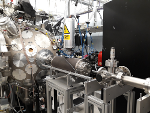| Version 23 (modified by , 4 years ago) ( diff ) |
|---|
The Centre for the Clinical Application of Particles
The Centre for the Clinical Application of Particles is an interdisciplinary collaboration of staff from the Faculty of Medicine, the Imperial Academic Health Science Centre, the Department of Physics, the Imperial CRUK Cancer Centre, the Institute of Cancer Research, the John Adams Institute and the Oxford Institute for Radiation Oncology with the mandate to:
"Develop the technologies, systems, techniques and capabilities necessary to deliver a paradigm shift in the clinical exploitation of particles."
The principal objectives of the CCAP are to:
- Deliver a broad programme of measurement of the radiobiological effect of particle beams and systematic studies of radiobiological mechanisms;
- Develop novel, compact, laser-driven accelerator systems for clinical applications; and
- Develop novel diagnostic, imaging, data-processing, and machine-learning techniques.
News
05May22:
- ZOOM Recording for the Rutherford Appleton Laboratory Lecture, 28th April 2022, "LhARA; a transformation approach to precision, personalised particle-beam therapy"
28Apr22: Disruptive technologies for proton/ion oncology workshop
Please register via the link on the indigo page.
"The present incidence of 17 million new cases per year globally predicted to increase to 27.5 million new cases per year by 2040. Radiotherapy (RT) is effective in cancer patients and is already involved in cancer cures. To increase the rate of diagnosis of cancer in the early, curative, stage implies an increasing need for therapeutic interventions including RT.
The use of novel beams with strikingly different characteristics has led to exciting evidence of enhanced therapeutic benefit, eg., therapy using very high dose per fraction, very high dose rate (> 40 Gy/s, "FLASH"), and “mini-beam” (MBRT). This evidence, together with developments in our understanding of personalised medicine based on the biology of individual tumours, now provides the impetus for a radical transformation of ion beam therapy (IBT).
While incremental development of cyclotron-, synchrotron-, and linac-based solutions are being pursued to enhance clinical capability, laser-driven proton and ion sources are disruptive technologies that offer enormous potential to satisfy the anticipated growth in demand for IBT by providing more flexible, compact and cost-effective high energy particle sources.
In this workshop we will discuss the state of the art in the provision of IBT and various approaches by which to deliver the step change in capability required to meet the projected growth in demand."
Please send news items to Ken Long ("k.long@…") or Ajit Kurup ("A.Kurup@…")
